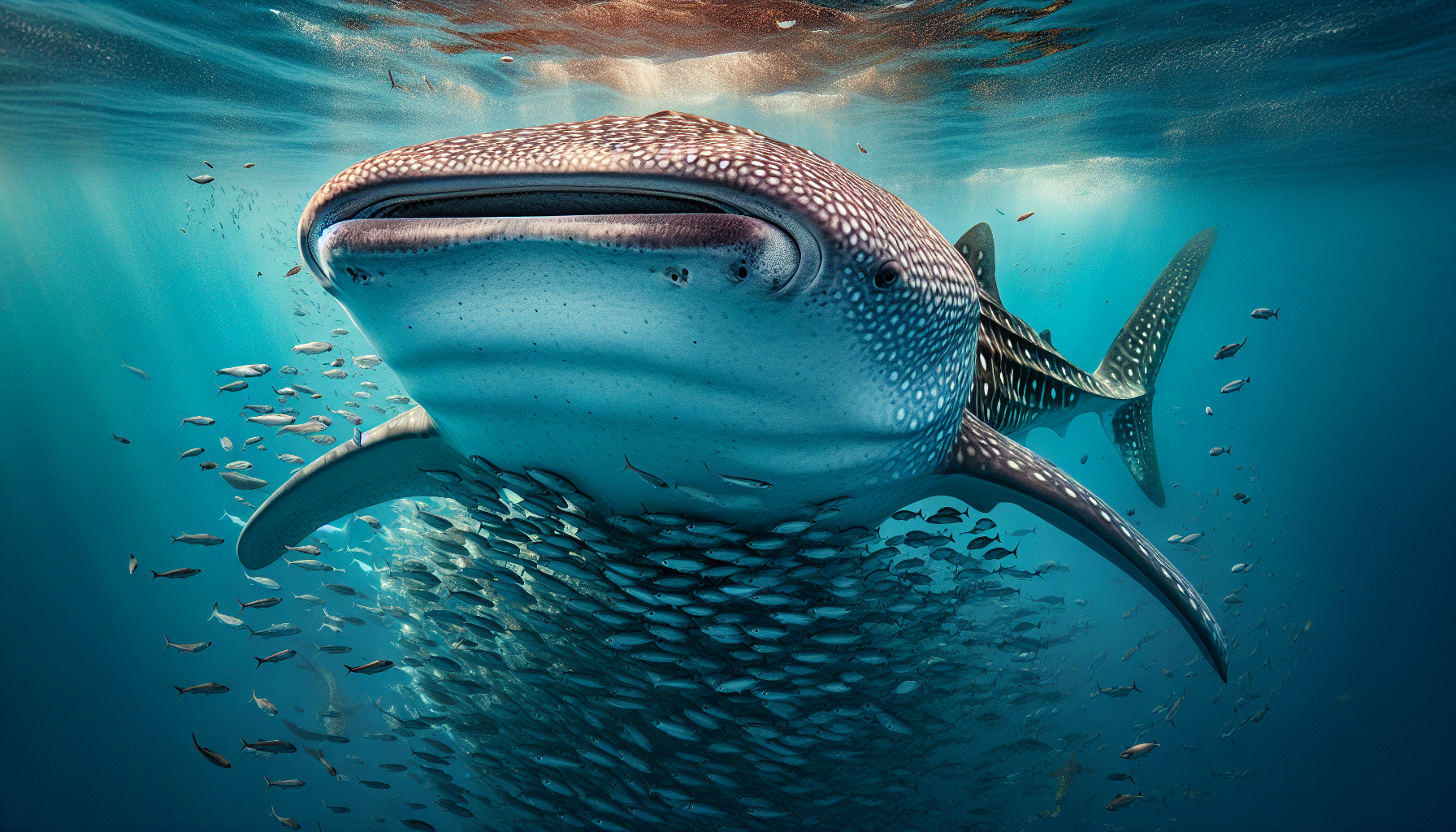
One notable feature is their skin, which can be up to 4 inches thick and is covered in a distinctive pattern of spots and stripes. This unique camouflage not only helps them blend into the shimmering waters of the ocean but also plays a role in social signaling among whale sharks. Each shark’s pattern is as unique as a human fingerprint, allowing researchers to identify individuals and track their movements across vast distances.
Their physiology also reflects their gentle nature. Whale sharks have a relatively slow metabolism and can traverse the ocean at a leisurely pace, often seen gliding gracefully through warm waters. To aid in buoyancy, they have large, oil-filled livers, which help them maintain a steady, upright position without expending much energy.
In addition, they exhibit fascinating breeding behaviors. Female whale sharks are ovoviviparous, meaning they give birth to live young rather than laying eggs. Observations off the coast of Mexico have revealed nursery areas where newborns gather, highlighting the importance of certain habitats for the survival of their young.
The unique biology of whale sharks not only defines their behavior and adaptability in the ocean but also underscores the intricate connections within marine ecosystems that sustain diverse life forms beneath the waves.
Their Role In Marine Ecosystems
As gentle giants of the ocean, whale sharks play a pivotal role in maintaining the health and balance of marine ecosystems. By filtering enormous quantities of plankton and small fish, these remarkable creatures help regulate the population dynamics of their prey. This feeding behavior facilitates the growth of phytoplankton and contributes to nutrient cycling within the ocean. Without the presence of whale sharks, the very fabric of the marine food web could experience disruptions, potentially cascading through various levels of marine life.
In addition to their feeding habits, whale sharks influence the behavior of other marine species. Their sheer size and slow movements create a sense of safety, allowing smaller fish to swim alongside them, benefiting from their protection against predators. This phenomenon fosters a unique symbiotic relationship and demonstrates how interconnected the inhabitants of the ocean truly are. Schools of fish often hang around whale sharks, taking advantage of the currents stirred up by their massive presence while also enjoying a free ride to abundant feeding grounds.
Furthermore, the gentle behaviors displayed by whale sharks, particularly during their breeding and gestation periods, can impact the marine environment significantly. The presence of nursery grounds off the coast, where newborns gather, emphasizes the need for the conservation of these specific habitats. These areas are crucial not only for the survival of juvenile whale sharks but also for various marine species that may rely on similar shallow environments for breeding and growth. Maintaining healthy ecosystems demands mindful attention to these habitats, as they serve as nursery wards for countless marine organisms.
In terms of oceanic health, the loss of whale sharks could lead to shifts in the entire ecosystem. With other species losing their protector and its associated relationships, one can imagine a ripple effect that could alter community structures and species interactions. The intricate dance of life continues as whale sharks create a balance, gently reminding us of the importance of preserving these gentle giants and the delicate environments in which they reside. This interconnectedness underlines the urgency of conscious conservation efforts for the benefit of all ocean life.
Conservation Efforts And Challenges
In recent years, conservation efforts aimed at protecting whale sharks have gained momentum, yet significant challenges persist. Many countries have recognized the importance of these gentle giants and have initiated regulations and guidelines to aid in their preservation. In places like the Maldives and Mexico, dedicated marine parks have been established to protect essential habitats from overfishing, shipping traffic, and pollution, ensuring a safer haven for whale sharks and other marine life.
Research initiatives have also played a crucial role in understanding the habits and migration patterns of whale sharks. Tagging and tracking these creatures provide insights into their behavior and the locations of their important feeding and breeding grounds. This data proves vital, as it informs better management policies and helps authorities make evidence-based decisions, such as the implementation of seasonal fishing restrictions in areas frequented by whale sharks.
Despite these positive strides, whale sharks face several obstacles. The global demand for their fins and meat poses a constant threat. Illegal fishing practices continue to jeopardize their populations, particularly in regions where enforcement of regulations is weak. Moreover, accidental catches in fishing gear remain a significant risk, as these creatures often become entangled in the nets designed for smaller fish.
Shifts in ocean health due to climate change also present daunting challenges for whale sharks. Rising sea temperatures, ocean acidification, and disruptions in food supply chains threaten the delicate balance of marine ecosystems. When plankton blooms shift or diminish, whale sharks may struggle to find food sources, impacting their feeding habits and overall health.
Awareness campaigns targeting local communities are essential for fostering a culture of conservation. By educating people on the ecological significance of whale sharks and promoting sustainable practices, it becomes possible to engender a sense of stewardship towards the ocean and its inhabitants. Collaborative efforts between NGOs, governments, and local stakeholders work towards creating a shared understanding of the intertwined fates of humans and whale sharks.
The road to saving these giants is a path fraught with challenges, yet the collective efforts of individuals, organizations, and nations can pave the way for a brighter future. As we deepen our understanding of these majestic creatures, it becomes increasingly clear that their survival is intertwined with our own actions in the ocean. Balancing human needs and marine conservation requires a commitment to sustainable practices, ensuring that the tranquil giants of the sea can continue to thrive in their natural habitat.

